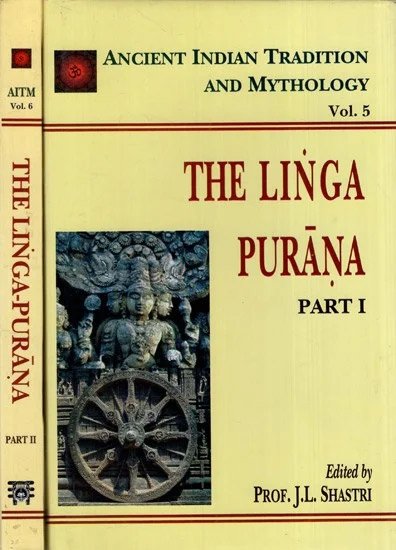The Linga Purana
by J. L. Shastri | 1951 | 265,005 words | ISBN-10: 812080340X | ISBN-13: 9788120803404
This page describes Statement of the Sages (rishivakya) which is chapter 33 of the English translation of the Linga Purana, traditionally authored by Vyasa in roughly 11,000 Sanskrit verses. It deals with Shaiva pilosophy, the Linga (symbol of Shiva), Cosmology, Yugas, Manvantaras, Creation theories, mythology, Astronomy, Yoga, Geography, Sacred pilgrimage guides (i.e., Tirthas) and Ethics. The Lingapurana is an important text in Shaivism but also contains stories on Vishnu and Brahma.
Chapter 33 - Statement of the Sages (ṛṣivākya)
Nandin said:
1. Thereafter the lord was delighted and he blessed them. On listening to their eulogy he spoke thus:
2. The brahmin who reads or listens to the hymn glorified by you all or narrates this to the brahmins shall attain leadership among my attendants.
3-4. O leading sages, I shall mention what is conducive to your welfare and sacred to the devotees. Everything feminine is goddess Prakṛti born of my body. O brahmins, everything masculine is Puruṣa born of my body. O brahmins, undoubtedly my creation is through both of these.[1]
5. Hence no one shall censure the naked ascetic who is devoted to me, who expounds Brahman but who behaves like children and mad people.
6-8. Those devotees of Mahādeva who are interested in applying ashes; who burn their sins through ashes; who are engaged in meditation and carry, out what has been laid down in the scriptures; who have perfect control over the senseorgans; who have sublimated their sexuality; who worship the great lord with perfect verbal, mental and physical control; reach Rudra’s world and do not return therefrom. Hence this secret, sacred and divine rite of the deity of manifest Liṅga.
9. The observers of the above holy rite have all types of forms; they shave off their heads and they observe the rite of ashes. No learned man shall revile at them nor should they be transgressed.
10. No one shall laugh derisively at them nor shall he speak words displeasing to them if he desires for welfare here and hereafter. The stupid man who censures them, censures the lord himself.
11-12. He who worships them worships Śiva. Thus, with a desire for the welfare of the worlds, the great lord sports about as a great yogin in every yuga, with ashes smeared all over his body.[2]
You too shall observe all the rites. Then welfare will be yours and you will attain perfection.
13. Grasping the great knowledge imparted by Śiva, which being incomparable is the destroyer of fear, the sages bent their heads and made obeisance to Śiva with their minds cleared of fear, greed and delusion immediately.
14-15. On hearing what was. recounted thus, the delighted brahmins, began the ablution of lord Śiva with pure scented waters with Kuśa grass and flowers scattered therein. They poured water out of water jars. They sang various songs of esoteric meaning and produced huṃkāras with sweet tones.
16. Obeisance to the overlord of Devas; obeisance to the great lord, obeisance to one who shares half of body with his consort;[3] obeisance to the initiator of Sāṅkhya and Yoga.
17. Obeisance to one who is black as a cluster of clouds. Obeisance to one wearing elephant’s hide. Obeisance to one having deerskin for the upper garment; obeisance to one having serpent for the sacred thread.
18. Obeisance to Śiva with wonderful well-arranged ear-rings; with well knit garlands and ornaments; to one with the fine lion skin as garb; obeisance to one of extensive reputation.
19. Then the delighted lord spoke to the sages—“O ye of good rites, I am delighted with your penance. Choose your boons.”
20-24. All those sages bowed to the lord. Then Bhṛgu, Aṅgiras, Vasiṣṭha, Viśvāmitra, Gautama, Atri, Sukeśa, Pulastya, Pulaha, Kratu, Marīci, Kaśyapa, Kaṇva and Saṃvarta of great penance, spoke to the lord after paying due homage: “We wish to know the mystic secret behind the smearing of ashes, nudity, indirectness (in worship) contrariety in the natural order,[4] the propriety of service or otherwise.” On hearing their words the great lord looked at the excellent sages and said smilingly.
Footnotes and references:
[1]:
The half man and half woman, form of Śiva known as ‘ardha-nārīśvara’. It symbolises the origin of creation by copulation. Of. Mahābhārata. as quoted in Śivatoṣiṇī.—[na padmāṅkā na cakrāṅkā na vajrāṅkā yataḥ prajāḥ | liṅgāṅkā ca bhagāṅkā ca tasmād māheśvarī prajā]
[2]:
Of. Bhagvadgaītā:—[yad yadācarati śreṣṭhas tattadevetaro janaḥ | sa yat pramāṇaṃ kurute lokastadanuvartate ||] || Quoted in Śivatoṣiṇī.
[3]:
See p. 18. note 27.
